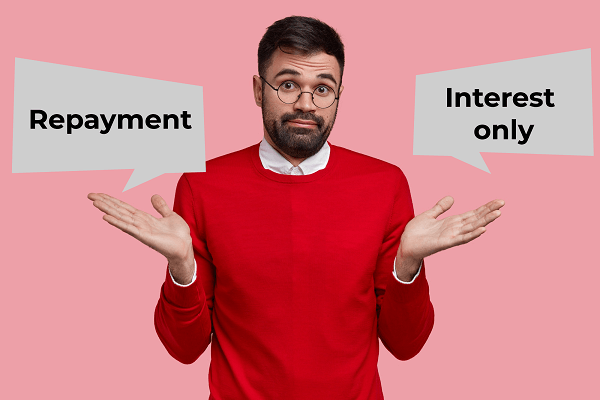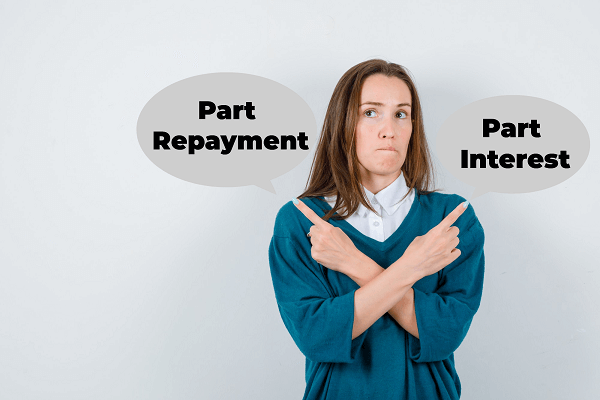Interest only and repayment mortgages
Mortgages can be confusing, especially when you are trying to decide which type is best for you. Today we are going to focus on two specific types: interest only and repayment mortgages. Both have their own unique benefits, so it is important to understand the differences before you make a decision. Let’s get started!
The following topics are covered below:
What is an Interest-only mortgage?
An interest-only mortgage, also known as an
interest-only remortgage, allows you to make monthly payments that solely cover
the loan’s interest. Monthly repayments on interest-only mortgages are cheaper
than on other types of mortgages. However, you’ll still owe the amount you
borrowed at the end of the term, and you’ll have to pay it back in full. This
is because your interest-only mortgage payments do not contribute to reducing
your debt. Instead, they only pay the interest on the money you’ve borrowed.
Here’s an illustration. The monthly repayments for a £180,000 interest-only
mortgage with a 3.5 per cent interest rate might be £525. However, you will still
owe £180,000 when the mortgage is paid off.
Getting an interest-only loan means that
you’ll have to come up with a way to pay it off when the loan is over. For
example, as a landlord, you might have a buy-to-let interest only loan (BTL).
This is a loan that only pays the interest on a rental property. Then, when the
mortgage term comes, It’s possible, though, that you have an interest-only
residential mortgage on a home that is your own. Then you’ll have to either
save money or invest during the term of your mortgage if that’s the case.

What is a repayment mortgage?
It’s the most common type of mortgage in
the market right now. If you want to buy a home to live in, you’ll almost
always get a repayment mortgage. This is because the interest on your debt and
some of the money you borrowed when you originally took out the loan are paid
for by the money you pay each month. So people who get mortgages pay a lot of
interest at the start. But that isn’t the only thing that will change. As your
debt gets smaller and the interest goes down, the bulk of your monthly payment
will be spent on paying off the capital.
Make sure you pay all your monthly mortgage
payments, and you’ll be done with your loan and interest in about 25 years.
It’s easier to pay off debt with a repayment mortgage because you pay off a
chunk of the debt and some of its interest each month. To make it happen, the
amount you pay each month is calculated to make sure you pay off the full
amount owed with interest—about 25 years. Then, in the future, when you have
paid off your mortgage in full, you will be able to own the house that you live
in.
The advantages of repayment mortgages are:
- You pay less interest in the long run because the amount you owe goes down each month. Later in the mortgage’s term, more of each payment is used to pay off the debt.
- People with smaller balances can get better deals on their mortgages later because they can get better deals when their balances are smaller.
- When the mortgage term is over, you will own your home if you pay all your bills on time.
However, the monthly instalments would be greater than an interest-only mortgage, so be sure you can afford them before applying.
Is repayment or interest only cheaper?
Many people think of a repayment mortgage as paying back both the interest and some of the capital simultaneously, but an interest-only mortgage doesn’t do that at all. Instead, you only pay back the interest each month and not any of the capital at all. With a repayment mortgage, you can expect your loan to be completely paid off when your term is over if you keep up with your payments. However, your monthly payments will also be higher than on an interest-only mortgage of the same amount.
But even though an interest-only mortgage can be cheaper each month, you’ll pay more in the long run. The reason is that with an interest-only mortgage, you always pay interest on the full value of the loan. With a repayment mortgage, the interest you’re charged will gradually go down as you pay off more and more of the loan.
Suppose you want to get a loan of $200,000 for 25 years at a 2% interest rate.
Which mortgage is more suited for me?
People who want to get a good mortgage deal
must think about their risk tolerance and other factors, like their credit
score, before they can find the best deal for them. Many people who have a lot
of money or are willing to pay a lot of money for an arrangement fee will get
better deals. However, you can’t pay a lot of money for an arrangement fee if
you only have a small deposit and don’t want to pay it.
If you want to get a loan, you should not
get an interest-only one. Make sure you know the risks and can save enough
money by the end of the term before getting one. To make money with your
investment, you would need to make money from it, and you should also have a
backup strategy to help you pay off your mortgage.

Can the mortgage terms be extended?
The lender may let you have more time for
the lump sum. In this case, you might be able to switch at least some or all
the loans to a repayment mortgage. By extending the term, you’ll pay less each
month, which will make it easier to pay. This method is only applicable to
younger borrowers, and your monthly repayments are likely to be substantial, so
you should consider your finances before committing. Some mortgage lenders may
be willing to extend the term of an interest-only mortgage, but it isn’t always
possible. Interest-only loans may be available from other lenders. This would
depend on the applicant’s situation and whether they could meet the lender’s
requirements.
If you can’t get a mortgage term extension,
there may be other ways to get money, like switching to a standard repayment
mortgage or a bridging loan, paying off the mortgage (if this is an option), or
selling the house. If you’re thinking about extending your mortgage term or
switching financial products, you should talk to a mortgage broker about your
options. They can give you expert advice and help you find the best deal for
you.
Can I get an interest only mortgage?
If you want to pay just the interest each
month, you can get an “interest-only” mortgage. The money you borrow isn’t paid
back until the end of the term. They are available to people who meet certain
income requirements and plan to pay back their borrowed money at the end of the
term. It’s very important that you find a way to raise or save the money to pay
off the full amount of your mortgage at the end of the term, which is usually
25 years, but the term length can be changed. You can still get a residential
interest-only mortgage if you meet certain requirements.
Many people can still get interest-only
deals, even though the rules have changed. However, people need to have a plan
for repaying their debt and meet all the mortgage lender’s other requirements.
- Whether you’re applying for a loan with a
partner or alone, you need to show that your annual income is enough to cover
the loan. - You also need to show the mortgage lender
that you can pay back the money you borrow. We work with experts who know which
lenders to talk to base on your situation so that we can find the best one for
you!

What happens at the end of interest only mortgage?
There is a time when you will have to pay back the full amount of your interest-only loan. If you can’t pay back all the money when your original mortgage is up, you can ask your current moneylender to extend the mortgage term or move to a new lender. If you have equity in your home, you might be able to use this money to pay off your mortgage.
Ask your current lender to make the loan term longer-
It’s possible to ask your current lender if they can help you get more time to pay off your mortgage. If you can show the creditor that you can pay off the debt over time, some lenders will be happy to extend your loan.
However, older borrowers might have difficulty getting their mortgage provider to extend the term because some providers don’t give loans to people over 75. The age limit is 85 with other lenders, but a few will let you get a loan even if you’re over 85; if the lender is sure, you can make the payments when you’re old enough. People who don’t make enough money might also have a hard time getting their lender to let them extend the mortgage term.
Remortgage to another lender-
If your mortgage company doesn’t let you extend the term of your loan, you can always look for a new lender and get a new loan. To remortgage with a new lender, you must start from scratch. You’ll have to pass their eligibility and affordability checks.
What happens at the end of repayment only mortgage?
There will be a due date for your mortgage when your term is up. After that, you must pay off the whole balance on your account and any loans that came with it (if the associated loans have also come to an end). Some rules and regulations come with your mortgage. This one is one of them. The most common type of mortgage is a loan that is paid back. Some of these will usually come to an end at the time you agreed to when you took out the mortgage, which is usually around 25 years. However, this isn’t always the case:
- you’ve made extra payments on your mortgage
- you’ve fallen behind on your payments or taken a mortgage break
- you’ve pushed back the end of your mortgage term
Whether you’ve cut your term or made it longer, your repayment mortgage will end when you’ve paid back 100% of the debt. Then you’ll own all your home’s value. This means that you own 100% of your home, and your mortgage lender will remove its charge from your home. Everything that you do with your newfound freedom is up to you. Many people use the extra money each month to pay their pension; others might relocate and downsize their homes to free up cash
What happens when you do part and part?
With a mixed mortgage, you pay some of your debt down each month but not all of it. When the mortgage is over, there will still be a lot of money left to pay off. Half of the time, people get part and part loans, which are in the middle of repayment and interest-only loans. This is also known as a “part repayment and part interest mortgage.” These are good if you want to pay less each month but still have less money to pay/balance up at the end of the term than you would with an interest-only loan.
There isn’t a single way that all part and part loans work. With your lender, you can talk about how much capital you pay off as you go and how much you pay off at the end. This can be done to fit your needs. However, many creditors limit how much money can be paid in interest only. In addition, Loan-to-value, or LTV, is usually a factor in how much money you can borrow against the value of your home. As a result, even though you can change the terms of a part repayment, part interest mortgage, you’ll have to pay back a good chunk of your mortgage in full. There’s a mortgage calculator on our site that can help you figure out how much you’ll pay each month with a part-payment, part-interest mortgage. In addition, a calculator can show you how paying some of your mortgage on a “capital and interest” and “interest only” basis can help you save money each month.
Is part repayment and part interest a good option?
Part repayment and interest-only mortgages might be an excellent option for those who have a legitimate repayment plan and want lower monthly payments than a traditional repayment mortgage. It also means you’ll have less capital to repay at the end of the term than if you’d taken out a fully interest-only mortgage. Some lenders consider part and part mortgages riskier than traditional full repayment mortgages, and not all repayment options suit everyone. As a result, you may have fewer options than if you were on a full repayment schedule, especially if other factors in your mortgage application can affect eligibility. The following are the primary considerations for qualifying for a part and part residential mortgage:
- The total of the repayment vehicle/plan/strategies.
- Whether or not the repayment vehicle is acceptable
- The loan-to-value ratio of the property (LTV)
Then there are the common factors that play a crucial role in any application, such as:
- Financial history
- Earnings and affordability
- The sort of property
- Age of the applicant
The money’s intended use (if a remortgage)
You must have a plan to repay the outstanding capital, which is referred to as establishing a repayment vehicle. There are various ways to achieve this, but all mortgage lenders will demand solid confirmation that your selected repayment vehicle is dependable (unless it is a buy to let property, as discussed later). In addition, they must be confident in your ability to make the remaining capital payments. Accepted repayment methods vary per lender, with the following being the most common:
- Sale of a second home
- Shares and stocks
- Policies concerning endowments
- ISAs for Stocks and Shares
- Bonds of Investment
- Pension

